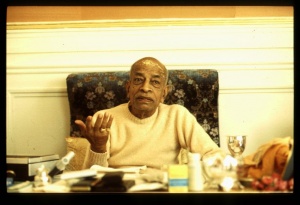SB 2.10.18: Difference between revisions
m (1 revision(s)) |
(Vanibot #0054 edit - transform synonyms into clickable links, which search similar occurrences) |
||
| (One intermediate revision by one other user not shown) | |||
| Line 1: | Line 1: | ||
{{info | {{info | ||
|speaker= | |speaker=Śukadeva Gosvāmī | ||
|listener=King | |listener=King Parīkṣit | ||
}} | }} | ||
[[Category:Srimad-Bhagavatam - Canto 02 Chapter 10]] | |||
[[Category:Bhagavatam Verses Spoken by Sukadeva Gosvami - Vanisource|021018]] | |||
<div style="float:left">'''[[Srimad-Bhagavatam]] - [[SB 2|Second Canto]] - [[SB 2.10: Bhagavatam Is the Answer to All Questions|Chapter 10: Bhagavatam Is the Answer to All Questions]]'''</div> | |||
<div style="float:right">[[File:Go-previous.png|link=SB 2.10.17]] '''[[SB 2.10.17]] - [[SB 2.10.19]]''' [[File:Go-next.png|link=SB 2.10.19]]</div> | |||
{{RandomImage}} | |||
==== TEXT 18 ==== | ==== TEXT 18 ==== | ||
<div | <div class="verse"> | ||
mukhatas tālu nirbhinnaṁ | :mukhatas tālu nirbhinnaṁ | ||
jihvā tatropajāyate | :jihvā tatropajāyate | ||
tato nānā-raso jajñe | :tato nānā-raso jajñe | ||
jihvayā yo 'dhigamyate | :jihvayā yo 'dhigamyate | ||
</div> | </div> | ||
| Line 16: | Line 22: | ||
==== SYNONYMS ==== | ==== SYNONYMS ==== | ||
<div | <div class="synonyms"> | ||
''[//vanipedia.org/wiki/Special:VaniSearch?s=mukhataḥ&tab=syno_o&ds=1 mukhataḥ]'' — from the mouth; ''[//vanipedia.org/wiki/Special:VaniSearch?s=tālu&tab=syno_o&ds=1 tālu]'' — the palate; ''[//vanipedia.org/wiki/Special:VaniSearch?s=nirbhinnam&tab=syno_o&ds=1 nirbhinnam]'' — being generated; ''[//vanipedia.org/wiki/Special:VaniSearch?s=jihvā&tab=syno_o&ds=1 jihvā]'' — the tongue; ''[//vanipedia.org/wiki/Special:VaniSearch?s=tatra&tab=syno_o&ds=1 tatra]'' — thereupon; ''[//vanipedia.org/wiki/Special:VaniSearch?s=upajāyate&tab=syno_o&ds=1 upajāyate]'' — becomes manifested; ''[//vanipedia.org/wiki/Special:VaniSearch?s=tataḥ&tab=syno_o&ds=1 tataḥ]'' — thereupon; ''[//vanipedia.org/wiki/Special:VaniSearch?s=nānā&tab=syno_o&ds=1 nānā]-[//vanipedia.org/wiki/Special:VaniSearch?s=rasaḥ&tab=syno_o&ds=1 rasaḥ]'' — various tastes; ''[//vanipedia.org/wiki/Special:VaniSearch?s=jajñe&tab=syno_o&ds=1 jajñe]'' — became manifested; ''[//vanipedia.org/wiki/Special:VaniSearch?s=jihvayā&tab=syno_o&ds=1 jihvayā]'' — by the tongue; ''[//vanipedia.org/wiki/Special:VaniSearch?s=yaḥ&tab=syno_o&ds=1 yaḥ]'' — which; ''[//vanipedia.org/wiki/Special:VaniSearch?s=adhigamyate&tab=syno_o&ds=1 adhigamyate]'' — become relished. | |||
</div> | </div> | ||
| Line 23: | Line 29: | ||
==== TRANSLATION ==== | ==== TRANSLATION ==== | ||
<div | <div class="translation"> | ||
From the mouth the palate became manifested, and thereupon the tongue was also generated. After this all the different tastes came into existence so that the tongue can relish them. | From the mouth the palate became manifested, and thereupon the tongue was also generated. After this all the different tastes came into existence so that the tongue can relish them. | ||
</div> | </div> | ||
| Line 30: | Line 36: | ||
==== PURPORT ==== | ==== PURPORT ==== | ||
<div | <div class="purport"> | ||
This gradual process of evolution suggests the explanation of the controlling deities (adhidaiva) because Varuṇa is the controlling deity for all relishable juices. Therefore the mouth becomes the resting place for the tongue, which tastes all the different juices, of which the controlling deity is Varuṇa. This suggests, therefore, that Varuṇa was also generated along with the development of the tongue. The tongue and the palate, being instrumental, are adhibhūtam, or forms of matter, but the functioning deity, who is a living entity, is adhidaiva, whereas the person undergoing the function is adhyātma. Thus the three categories are also explained as to their birth after the opening of the mouth of the virāṭ-puruṣa. The four principles mentioned in this verse serve to explain the three main principles, namely the adhyātma, adhidaiva and adhibhutam, as explained before. | This gradual process of evolution suggests the explanation of the controlling deities (''adhidaiva'') because Varuṇa is the controlling deity for all relishable juices. Therefore the mouth becomes the resting place for the tongue, which tastes all the different juices, of which the controlling deity is Varuṇa. This suggests, therefore, that Varuṇa was also generated along with the development of the tongue. The tongue and the palate, being instrumental, are ''adhibhūtam'', or forms of matter, but the functioning deity, who is a living entity, is ''adhidaiva'', whereas the person undergoing the function is ''adhyātma''. Thus the three categories are also explained as to their birth after the opening of the mouth of the ''virāṭ-puruṣa''. The four principles mentioned in this verse serve to explain the three main principles, namely the ''adhyātma'', ''adhidaiva'' and ''adhibhutam'', as explained before. | ||
</div> | </div> | ||
__NOTOC__ | |||
<div style="float:right; clear:both;">[[File:Go-previous.png|link=SB 2.10.17]] '''[[SB 2.10.17]] - [[SB 2.10.19]]''' [[File:Go-next.png|link=SB 2.10.19]]</div> | |||
__NOTOC__ | |||
__NOEDITSECTION__ | |||
Latest revision as of 21:12, 17 February 2024

A.C. Bhaktivedanta Swami Prabhupada
TEXT 18
- mukhatas tālu nirbhinnaṁ
- jihvā tatropajāyate
- tato nānā-raso jajñe
- jihvayā yo 'dhigamyate
SYNONYMS
mukhataḥ — from the mouth; tālu — the palate; nirbhinnam — being generated; jihvā — the tongue; tatra — thereupon; upajāyate — becomes manifested; tataḥ — thereupon; nānā-rasaḥ — various tastes; jajñe — became manifested; jihvayā — by the tongue; yaḥ — which; adhigamyate — become relished.
TRANSLATION
From the mouth the palate became manifested, and thereupon the tongue was also generated. After this all the different tastes came into existence so that the tongue can relish them.
PURPORT
This gradual process of evolution suggests the explanation of the controlling deities (adhidaiva) because Varuṇa is the controlling deity for all relishable juices. Therefore the mouth becomes the resting place for the tongue, which tastes all the different juices, of which the controlling deity is Varuṇa. This suggests, therefore, that Varuṇa was also generated along with the development of the tongue. The tongue and the palate, being instrumental, are adhibhūtam, or forms of matter, but the functioning deity, who is a living entity, is adhidaiva, whereas the person undergoing the function is adhyātma. Thus the three categories are also explained as to their birth after the opening of the mouth of the virāṭ-puruṣa. The four principles mentioned in this verse serve to explain the three main principles, namely the adhyātma, adhidaiva and adhibhutam, as explained before.